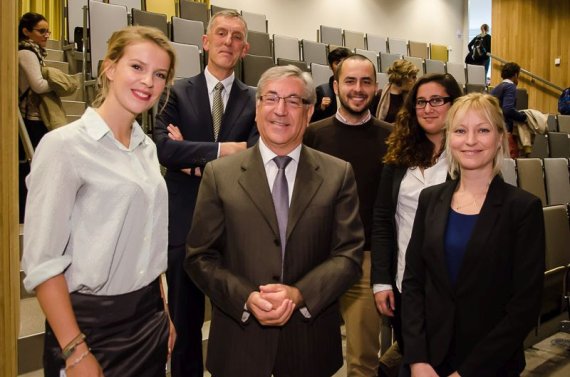European commissioner Karmenu Vella surrounded by (from left to right) Mischa Streekstra, Arthur Mol, Christos Giatsis, Vera Felix da Graca Silva and Charlotte Verburg. Photo: Aart-Jan van de Glind.
In Orion, Vella held a plea for sustainable economic growth. ‘Ensuring growth and prosperity for all is simply impossible with the current linear economic model.’ He pleaded for a circular economy. Without using the term cradle-to-cradle he told the room with about fifty listeners – many of them students – that we should design products that are easier to recycle. He also mentioned the "economy of sharing" as a new business model and he spoke about “blue and green growth”. ‘The planet consists of 70 percent seas and oceans, but 95 percent of our economic activity takes place on land.’ That it pays off to use seas has been proven by the success of offshore wind parks, he argued. ‘In 2007 that sector hardly existed, now there are 75.000 people working there. That is half as many as there are fishermen.’

The planet consists of 70 percent seas and oceans, but 95 percent of our economic activity takes place on land.
European Commissioner Karmenu Vella
‘Many open doors, but still it is good to hear it from somebody in that a position’, was Mischa Streekstra’s reaction afterwards. She was one of the four students that were invited to tell the European Commissioner and the rest of the audience about their passion for an environmental or fishery topic. She explained that she will soon start her PhD at Marine Animal Ecology to study the effects of acidification of oceans on the physiology of shellfish. Vella responded that her research will undoubtedly contribute to the right tools to elucidate the consequences of acidification. ‘Research is important’, he said multiple times that morning. ‘Yes, I am positively surprised’, Streekstra reacted. ‘Usually politicians say: is all that research necessary?’
Charlotte Verburg, master student of Environmental sciences, thought that the European Commissioner spoke in very general terms. She had given a presentation about waste in the sea, in particular about plastic waste, and wanted to know what the commissioner was doing against this problem. His reply that waste needs to be seen as valuable asset and that recycling was a large part of the solution, was disappointing for Verburg.
But there were also students that undoubtedly went home with a very positive feeling. A group of students that had worked on a project to map the “emerging trends” of sea use asked the commissioner what the opportunities and threats were. Although they did not get a direct answer from Vella, he did invite them to visit his department in Brussels. And afterwards the students also took the opportunity to ask one of the PhD candidates present if he could name a few “emerging trends”. Christos Giatsis, who held his presentation about the consequences of the development of vegetarian feed for carnivore fish, patiently answered the students.
After the meeting with the students, the European Commissioner visited the NIOO, the World Soil Museum and the aquaculture facilities in Zodiac.

